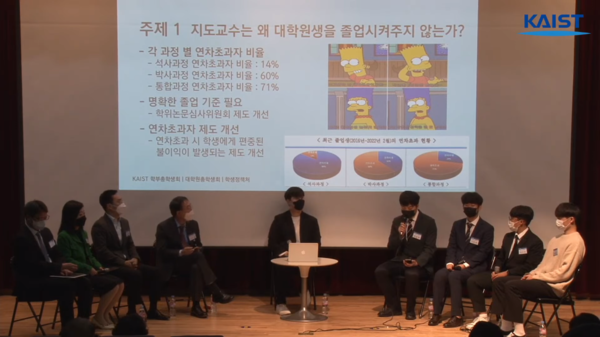The second KAIST Town Hall Meeting opened on November 2 at the KI Building (E4) with the main objective of resolving problems raised by students . A total of nine panelists attended the meeting — five school officials and four student council members. Held in a hybrid format, the Town Hall Meeting consisted of three sessions: “We Need To Talk”, in which three topics prepared in advance were addressed; “Ask Anything”, in which the audience could freely ask questions to both staff and student councils; and “I Can Finally Say…”, which gave students an opportunity to bring up more sensitive topics in the absence of school staff.

The student representatives started the first session by addressing the first discussion topic, “Why don’t professors let their students graduate?” covering the structural problems of graduation requirements in graduate school. The president of the Graduate Student Association (GSA) pointed out that 13% of MS, 60% of PhD, and 71% of combined MS/PhD course students are not able to graduate on time. He further continued that “such delayed graduation results in a lower faculty-to-student ratio and QS university ranking” and inquired school officials about possible solutions. Seung Seob Lee, the Provost and Executive Vice President, pointed out that the average number of semesters spent before graduating from KAIST is similar to that of typical US universities and stated that “as the academic discipline advances and the amount of things to learn keep increasing, it is necessary to consider whether pushing the graduation semester forward is the right direction.” However, he acknowledged, “We will make sure that students in their fifth year will also reap the same benefits [as those graduating on time].” Additionally, he highlighted that professors are also responsible and suggested that the implementation of policies such as one that mandates the professor to share the financial burden that students carry may reduce this problem.
The KAIST Undergraduate Association (UA) then raised the subject of “Price and quality of food and inconveniences at school cafeterias”. The Secretary of Policy of the UA compared the quality and price of food in different universities and questioned why KAIST could not provide cheap and high-quality food for students. Gun Cheol Kim, the Director of Customer Management, stated that their team has been aware of such complaints among staff and students and are attempting to address them. One way they are trying to act on students’ requests and complaints is to open a cafeteria in W2 with Pulbitmaru, the halal-certified restaurant in N12, to increase the number of halal cafeterias on campus.
Finally, following a highly controversial incident where a professor slapped a graduate student in June, the school and student representatives discussed the need to emphasize human rights and ethics. The Director of the Center for Ethics and Human Rights remarked that the center has been ceaselessly communicating with students regarding their rights and pointed out that the platform is established so that students’ anonymity is guaranteed and their feedback can be effectively considered. There were also a few comments regarding how the slapping incident is being handled. The school officials stated, “The disciplinary committee, including former judges, has been painstakingly investigating the case, and hence please bear with us.” The judgment is expected to be made soon.
During the second and third sessions of the Town Hall Meeting, a vast range of topics, complaints, and suggestions were reviewed. Attendees posed structural changes that seemed necessary, such as the need to modify vacation systems for technical research personnels, the need for PhD coordinators, and improvements to the URS raffle system in the post-COVID era. Budget was also a point of concern, as some contended that the school budget was misallocated to unnecessary festivals, while others pointed out that although the renovation of Jihye Hall (N21) seems pressing, there is insufficient budget to do so. Other important topics discussed were the lack of parking spaces on campus, the inefficiency of the Daejeon Special Zone City Bus No.1 route, and the need to foster more interaction between Korean and international students.
One student who attended the meeting in person shared their opinion with The KAIST Herald that the second Town Hall Meeting was more meaningful than the first, as there were more interactions between the school officials and students. They further commented, “I hope the topics, complaints and requests that were discussed today will be taken into consideration for the students’ well-being.”

